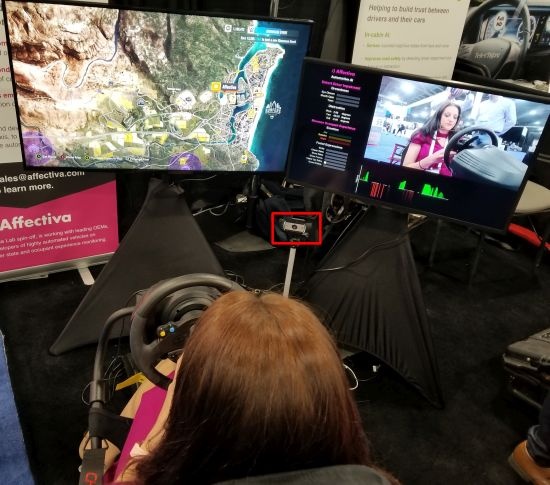-1.jpg?width=644&height=859&name=IMG_5467%20(1)-1.jpg)
Affectiva and Wind River® have collaborated to help original equipment manufacturers (OEMs) and Tier 1 suppliers improve road safety by identifying dangerous in-cabin driving behavior in real time. Delivering comprehensive people analytics, Affectiva Automotive AI measures both complex and nuanced emotional and cognitive states from face and voice. And as connected and autonomous cars evolve, this collaboration will allow automakers to understand the in-cabin environment so that it can be adapted to enhance and deliver a safer mobility experience.
Leveraging the safe, secure, and reliable consolidated compute technologies from the Wind River Helix™ Chassis portfolio, AI emotion-sensing technology can enhance in-vehicle infotainment experiences, influence in-cabin controls, and further the enablement of advanced driver assist systems (ADAS). With scalable computing in a lower-power package, impressive graphics capabilities, and security features—all powered by the Wind River safe and secure software —the solution allows automakers and suppliers to deploy turnkey, automotive grade solutions to market faster, with lower costs.

The Automotive Problem
As drivers expect increasing levels of connectivity in the car, automakers and suppliers must differentiate their offerings by creating immersive digital and artificial intelligence (AI) experiences that stand out in a crowded market. By using a cutting edge safe and secure consolidated compute platform for in-vehicle experiences, designing and incorporating AI and connected features become simpler, more powerful, and more cost-effective, enabling automakers to maximize profit margins while delivering on market demands.
While AI in automotive has historically focused on what’s going on outside of the vehicle, OEMs and Tier 1 suppliers are beginning to turn cameras and sensors inward as well, using AI to gather insights into what’s going on with the people inside the vehicle. And looking ahead to the evolution of autonomous capabilities, AI will be an important enabler to identify when the vehicle should take over control from the driver. Every day, more than 1,000 injuries and 9 fatalities are caused by distracted driving in the U.S.—and up to 6,000 fatal crashes each year may be caused by drowsy drivers. This indicates a major need for driver monitoring to help improve road safety.
4 Key Advantages of the Affectiva and Wind River Combined Solution
- Leveraging Affectiva Automotive AI data collected about vehicle occupants in order to create software-driven services that deliver great experiences, such as: – Personalizing content recommendations, including video and music, based on the emotions of the passengers; making e-commerce purchase recommendations based on reactions to the content that is served or the route that is taken – Adapting in-cabin environmental conditions, such as lighting and heating, based on levels of comfort and drowsiness – Understanding user frustration or confusion with virtual assistants and conversational interfaces and designing these to be emotion-aware, so they can respond in an appropriate and relevant manner
- Detecting levels of driver fatigue and distraction to enable appropriate alerts and interventions that correct dangerous driving, such as an audio or display alert that instructs the driver to remain engaged or seat belt vibration to jolt the driver to attention
- Monitoring driver anger to enable interventions or route alternatives that avoid road rage; for example, a virtual assistant guides the driver to take a deep breath, the driver’s preferred soothing playlist comes on, the GPS suggests a stop along the way
- Addressing handoff challenges between driver and car in semi-autonomous vehicles: when sensing driver fatigue, anger, or distraction, the autonomous AI can determine whether the car must take over control; when the driver is alert and engaged, the vehicle can pass back control
Affectiva Automotive AI
Affectiva Automotive AI is the first in-cabin sensing AI that identifies, in real time from face and voice, complex and nuanced emotional and cognitive states of a vehicle’s occupants. This provides OEMs and Tier 1 suppliers with comprehensive people analytics, enabling them to build advanced driver monitoring systems as well as differentiated in-cabin experiences that span the autonomous vehicle continuum. Affectiva’s solution also allows developers of automated driving systems to improve their technology for use in robo-taxis and other highly automated vehicles in the emerging automated mobility sector.
Wind River
The Wind River Helix Chassis portfolio includes a comprehensive consolidated compute platform allowing carmakers to successfully deliver next-generation features that are production grade while ensuring high standards of safety, security, and quality. Wind River offerings are ideal for building domain controllers that consolidate multiple, single-function ECUs by implementing them in a virtualized, software-defined environment. Carmakers can use Wind River software to deliver rich in-cabin experiences and seamlessly extend digital life into connected vehicles. The result is a flexible, scalable, extensible, and remotely updatable platform, addressing consumer demand for increased connectivity while accelerating time-to-market and cost reduction for automakers and their suppliers.
The Bottom Line
As artificial intelligence evolves to play an increasingly important role in semiautonomous and autonomous vehicle development, it is exciting to dive deeper into emotional AI technology via the Wind River collaboration with Affectiva. Although it can be nuanced and subtle, the human emotional experience is still a driving factor in the connected car of the future.
Interested in learning more about the different AI applications - from automotive and robotics, to healthcare, education and even advertising? At this year’s Emotion AI Summit we discussed Trust in AI and how Emotion AI is a key component of building trust between humans and technology. Download sessions now.






